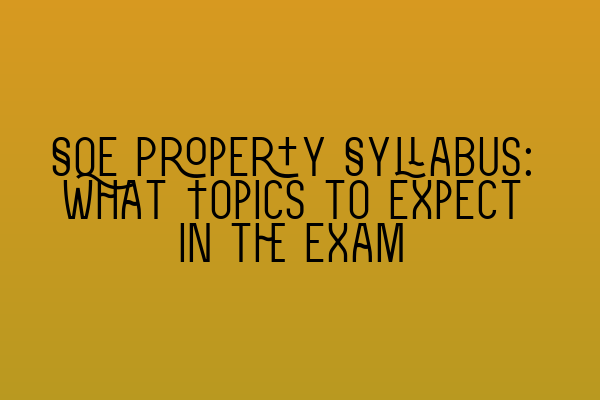SQE Property Syllabus: What Topics to Expect in the Exam
If you’re preparing to take the SQE Property Law and Land Law exam, it’s important to understand the topics that will be covered. Having a clear understanding of the syllabus will help you focus your studies and ensure you are well-prepared for the exam. In this blog post, we will provide an overview of the key topics you can expect to encounter in the SQE Property exam.
1. Land Law Basics
The exam will likely start with a focus on the fundamentals of Land Law. This will include key concepts such as the nature of land ownership, the different types of interests in land, and the legal requirements for the creation and transfer of these interests. Understanding these foundational principles is essential for tackling the more complex topics that will follow.
2. Co-ownership
Co-ownership is another important area that is likely to be covered in the exam. This involves the legal principles surrounding the ownership of land by multiple parties, including joint tenancies and tenancies in common. It’s essential to understand the rights and responsibilities of co-owners, as well as the ways in which co-ownership relationships can be terminated.
3. Leases and Tenancies
Leases and tenancies are a significant area of property law, and it’s highly likely that questions related to this topic will appear in the SQE exam. You should familiarize yourself with the different types of leases, including residential and commercial leases, and be aware of the legal obligations that landlords and tenants have towards each other. It’s also important to have a good understanding of how leases can be terminated and what remedies are available to parties in the event of a breach of lease terms.
4. Purchasing and Selling Property
The process of buying and selling property is another crucial area that will be assessed in the SQE Property exam. You should be well-versed in the legal requirements for a valid contract of sale, including the essential elements and the impact of misrepresentation and mistake. Additionally, understanding the process of transferring ownership, including the role of conveyancing, will be essential.
5. Mortgages
Mortgages are a common method of financing property purchases, and you can expect questions on this topic in the SQE exam. Key areas to focus on include the creation and registration of mortgages, the rights and responsibilities of the mortgagor and mortgagee, and the remedies available to each party in the event of default.
6. Landlord and Tenant Law
Landlord and Tenant Law is a substantial area of property law, and it’s highly likely that the SQE exam will cover important topics, such as the rights and obligations of landlords and tenants, including the impact of the Landlord and Tenant Act 1954. Understanding the process for terminating a tenancy, including eviction procedures, and the legal requirements for rent increases and repairs will also be crucial.
Remember, this blog post only provides a brief overview of the topics likely to be covered in the SQE Property Law and Land Law exam. To delve into each topic in more detail, make sure to check out our related articles:
– Understanding Contractual Capacity: Rights and Limitations
– Interactive SQE Mock Tests for Contract Law: Test Your Knowledge
– Join Our SQE Contract Law Webinars: Expert Insights and Guidance
– Contract Law Reforms: An Analysis of Recent Changes
– Parties in a Contract: Rights and Responsibilities
By studying these resources and utilizing effective study techniques, you can feel confident about your preparation for the SQE Property Law and Land Law exam. Good luck!
